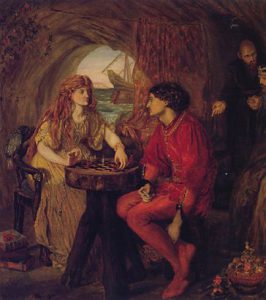 When I would explain the Decalogue to children, I’d say something like: God didn’t give us rules because he wanted to ruin our fun. These rules are God’s way of saying, “Don’t hurt yourself. You are made in my image. I love you. I want you to be happy. Do these things and avoid these other things, and you’ll truly be happier.”
When I would explain the Decalogue to children, I’d say something like: God didn’t give us rules because he wanted to ruin our fun. These rules are God’s way of saying, “Don’t hurt yourself. You are made in my image. I love you. I want you to be happy. Do these things and avoid these other things, and you’ll truly be happier.”
That’s a segue in to the terrific essay by Anthony Esolen today at Crisis. He drills into virtue in general and chastity in particular using The Tempest as his spring board.
Esolen gets Shakespeare, as he gets Dante. I’m a sucker for Shakespeare and for Dante.
Here is a taste of Esolen’s piece:
[…]
Now the power the Miranda possesses, both as subject and object, is ineradicable from her innocence and purity, which in her assume a distinctly womanly form. I imagine that everyone has seen a man who appears unpleasantly handsome, because the vicious life he leads has begun to show in his countenance—the leering eye, the cold smile, debauchery in the lip and jowl; or a woman unpleasantly beautiful, because of a vicious life of her own—the look of a whore, perhaps, without the poverty and suffering. Miranda is what she is because of her virtue, the very thing that the feminist critic found appalling. It is as if the critic were railing against Prospero for having fed his daughter good food and given her plenty of fresh air and sunshine for the health of her body.
For virtue is like health. That is something Shakespeare understood quite well, and the feminist critic did not. The typical charge against Prospero is that he has used his magic art to cause Ferdinand [not the bull in the book] to fall in love with Miranda, [not the planet in the Firefly movie] stealing her freedom from her—“freedom” understood as self-will, autonomy, the spoiled teenager’s “I want it!”—but Miranda needs no art to make her wondrous, and when the young people meet, Prospero suggests that the magic is in them: “They are both in either’s powers.”
Virtue is a power, a liberating power. Let us repeat it every day. Virtue is not the possession of the “right” political opinion, no more than it was, among the upper classes in Victorian England and in the growing American state, the possession of the right books and objets d’art, attendance at the right religious services, knowing the right people, speaking with the right accent, wearing the right clothes in public, and extending the right pinky while you were drinking the right tea from the right china arranged in the right way.
[…]
Read the rest there. It’s great.
 Just as a reminder…. Esolen translated Dante’s Divine Comedy into English and did a great job of it.
Just as a reminder…. Esolen translated Dante’s Divine Comedy into English and did a great job of it.
If you have never read the Divine Comedy, you should. You could start with Esolen (Part 1, Inferno US HERE – UK HERE) or perhaps with Dorothy Sayer’s fine version (Part 1, Inferno, US HERE – UK HERE). There are many renderings to choose from. I would very much like to teach on Dante someday. Maybe it’ll happen.
When you make the excellent choice to read the Divine Comedy, here are a couple tips. First and foremost, make the decision that you will read the whole thing. Don’t read just the Inferno. The really great stuff comes in Purgatorio and Paradiso. Also, read straight through a canto to get the line of thought and story and then go back over it, also looking at the notes in your edition. Dante was, perhaps, the last guy who knew everything (with the possible exception of Erasmus). Each Canto is dense with references. You will need notes to help with the history, philosophy, cosmology, poetic theory, politics, theology, etc. Really. You will need help.


































” I would very much like to teach on Dante someday. Maybe it’ll happen.”
oh yea, it’ll happen when you get to monsignor!
All kidding aside. i am in the middle of The D. C.omedy with the Great Courses [The Learning Company]. Its a start. (allows me to pedal my bike/trainer while i listen).